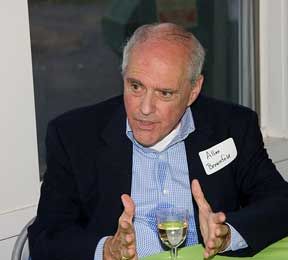
Publisher:
Bonnie King
CONTACT:
Newsroom@Salem-news.com
Advertising:
Adsales@Salem-news.com

~Truth~
~Justice~
~Peace~
TJP
Oct-09-2013 21:49

 TweetFollow @OregonNews
TweetFollow @OregonNews
Israel's Reaction to EU Sanctions: 'Anti-Semitism,' Comparison to Nazism
Allan C. Brownfeld Salem-News.com"Without. Israel, widespread anti-Semitism in post-Holocaust Europe would most likely not have awakened from its dormancy."
- Hillel Halkin
 Images by Carlos Latuff, friend of Salem-News.com in Brazil |
(WASHINGTON DC) - Under guidelines adopted by the executive European Commission in June, Israeli "entities" operating in the West Bank and East Jerusalem will not be eligible for European Union (EU) grants, prizes or loans in the future.
Some 500,000 Israelis live in the West Bank and East Jerusalem among 2.5 million Palestinians. Israel captured those territories, along with the Palestinian Gaza Strip and Syrian Golan Heights, in the 1967 war. It quit Gaza in 2005 but has annexed the Golan, another territory affected by the EU move. In response, the Israeli government announced curbs on EU aid projects for thousands of West Bank Palestinians.
The EU guidelines will prevent Israeli ministries, public bodies and businesses that operate in occupied Palestinian territory from receiving loans worth hundreds of millions of Euros each year from the European Investment Bank (EIB). The EU will also stop awarding grant funding to Israeli ministries, public bodies or private businesses for activities that take place in occupied Palestinian territory, even if they are headquartered inside Israel's pre-1967 borders.
The new guidelines exclude any Israeli entity with activity in the occupied territory from participating in EU financial instruments such as loans. Among those excluded from receiving loans from the EIB will be major Israeli banks including Bank Hapoalim, Mizrahi Tefahot Bank and Bank Leumi because they all operate illegally in the occupied territory, including having branches in illegal Israeli settlements.
Recent EIB loans such as €120 million lent to national Israeli water company Makorot in 2011 or the €40 million lent to electric car company Better Place in 2012, would not have been granted under the new rules as both companies have sizable activities in the occupied territory. The EIB has provided finance amounting to almost €1 billion to Israeli entities since 1981.
There is some evidence that the U.S. is not displeased with the EU sanctions. HAARETZ (Oct. 8, 2013) reports that, "A senior EU official told an Israeli diplomat last week that the U.S. is quietly supporting new EU sanctions against the settlements... senior State Department officials said that publishing the guidelines...actually contributed to the effort to restart (Israeli-Palestinian) negotiations. The EU move bolstered...Mahmoud Abbas, they said, making it easier for him to agree to hold talks despite Israel's refusal to freeze settlement construction. At the same time, it pressured...Netanyahu to agree to the talks by making it clear that if negotiations didn't resume, Israel's international isolation would worsen."
On July 30, EU foreign policy commissioner Catherine Ashton published a letter to her fellow commissioners informing them that by the end of the year the EU will publish binding requirements for specially labeling Israeli goods produced beyond the 1949 Armistice Lines exported to EU member states. Lithuanian Foreign Minister Linas Linkevicius described the proposed labeling as an alternative to a broader boycott of all Israeli good.
Israel's response has been, even in the opinion of some Israelis, excessive. Representatives of West Bank settlements, including Israel's ambassador to the EU and members of the Knesset requested and were granted a special parliamentary session in Brussels in September in which to present their opposition to the EU's new policy.
This is what MK Ayelet Shaked (of Naftali Bennett's Habayit Hayehudi Party) told the parliamentary session: "If Europe thinks Jews will return to the days where we were forced to mark our products---- you can forget it. Delegitimization of parts of Israel by Europe is the new anti-Semitism. The old anti-Semitism led to the destruction of our people in gas chambers. We will not allow the new anti-Semitism to hurt us."
Discussing the comparison of the EU with Nazi Germany and the Holocaust, Emily Hauser, writing in The Daily Beast's Open Zion (Sept. 20, 2013), notes that, "Whatever you think of the settlement enterprise, not even Israel thinks that the West Bank is 'part of Israel.' Those lands haven't been annexed, and indeed their future is (putatively at least) under negotiation by the Israeli government... This is not the first time that anti-settlement policies have been likened unto racism, anti-Semitism and/or the Holocaust and it probably won't be the last...Many, many Israelis understand there is simply no intellectually honest way to shoe-horn a decision to suspend 'grants, prizes and financial instruments ...to Israeli entities or to their activities in the territories occupied by Israel since June 1967' into the idea of hating Jews because they are Jews. Or into the idea of killing them. It's ahistorical. It's nonsensical...And it's deeply, profoundly offensive."
In Hauser's view, "When Shaked (or Dani Dayan or Avigdor Lieberman or Zeev Elkin) say these things, they're using the screams of babies , numbers burned into flesh, and ashes that once rose into heaven to try to shame the world into accepting right-wing dogma as settled fact. It is, simply put, grotesque....The EU doesn't oppose the West Bank settlements because the people living in them are Jews. The EU opposes the West Bank settlements because the people living in them (and the government that sent them) are breaking international law...But Israel's right-wing (and the Americans who support it) want the world to simply give up and give in...and they're not above exploiting the deaths of 6 million people to do it."
 |
Discussing what he described as "Anti-European hysteria," David Newman, dean of the Faculty of Humanities and Social Sciences at Ben-Gurion University, lamented that, "The use of Holocaust and anti-Semitism rhetoric the moment there is the slightest criticism from Europe is cheap and sensational."
Writing in THE INTERNATIONAL JERUSALEM POST (July 26-August 1, 2013), Newman declares that, "The most irresponsible of all the responses was from one of the country's most respected journalists, Dan Margalit, who used the imagery of the 'yellow star' to characterize the impact of the EU decision on Israeli residents impacted by the new regulations. Such rhetoric does no more than cheapen the very real memory of the Holocaust and the very real dangers of anti-Semitism. Those who use such arguments to counter a political criticism have lost all sense of perspective concerning contemporary Israel and contemporary Europe. The use of such invective is irresponsible and displays a clear lack of clarity on the part of people who occupy positions of power and who should know a lot better, even if they strongly disagree with the EU decisions. Deputy Foreign Minister Zeev Elkin and Economy and Trade Minister Naftali Bennett are certainly doing their best to even further destroy Israel's image abroad."
 |
At the same time, there is a growing campaign in Israel and among some of its friends in the U.S. and elsewhere to promote the idea that anti-Semitism is growing within the EU and that European Jews should abandon their homes and emigrate to Israel. This is, of course, part of the traditional Zionist narrative which holds that Israel is the "homeland" of all Jews, that those living elsewhere are in "exile," and that all Jews should make "aliya," emigrate to Israel.
In a much discussed article in MOSAIC (Aug. 15, 2013), Michael Gurfinkiel poses this question: "Vibrant Jewish communities were reborn in Europe after the Holocaust. Is there a future for them in 21st century Europe?"
Mr, Gurfinkiel admits that, "European Judaism looks healthy and secure, religious and cultural activities are everywhere on the rise. Last December in the southern German state of Baden-Wurttenberg, an exquisite new synagogue was inaugurated in Ulm, the most recent in a long series of new or recently restored sanctuaries in Germany. In Paris, a European Centrr for Judaism will soon be built under the auspices of the Consistoire (the French Union of Synagogues) and the French government). In Paris, a visitor can proceed from the National Museum for Jewish Art and History to the Shoah Memorial to the Drancy Holocaust Memorial. Berlin hosts the Judisches Museum designed by Daniel Libeskind."
And yet, Gurfinkiel reports, "...the majority of European Jews...insist that catastrophe may lie ahead." He paints a picture of growing anti-Semitism by which, other than examples of friction between Jews and immigrant Muslim communities, he means "the incessant spewing of hatred against the people and the State of Israel at every level of society, including the universities and the elite and mass media...According to rabbinic tradition, anti-Semitism starts when Jews beguile themselves into thinking they can fulfill their destiny in exile...Once again, Jews are accepted on condition that they separate themselves from their brethren in Israel and join the official European consensus in demonizing the Jewish state...Can it really be that European Jewry was reborn after the Holocaust only in order to die again?...The expiration date looms nearer..."
 Robert Wistrich of Hebrew University |
Robert Wistrich of Hebrew University, author of studies of anti-Semitism, has concluded that although the final endpoint of European Jewry may be decades in coming, any clear-sighted and sensible Jew who has a sense of history would understand that this is the time to get out.
Also writing in MOSAIC (Aug. 26, 2013), Hillel Halkin, who emigrated to Israel from the U.S. and is a long-time contributor to COMMENTARY and the author of a biography of Revisionist Zionist leader Ze'ev Jabotinsky, declares that it is, "No great loss if the Jews of Europe were to leave."
As with others who define "anti-Semitism" as criticism of Israel, Halkin admits that, "Without. Israel, widespread anti-Semitism in post-Holocaust Europe would most likely not have awakened from its dormancy... The reversal of roles whereby Israelis are now cast as the Nazi aggressor and the Palestinians as their helpless victims has been a wonderful salve for the European conscience. It has enabled Europe to say: 'By what right do you Jews blame us?You are doing to others what Hitler did to you."
Halkin concludes: "No one can say whether the current anti-Israel and anti-Jewish mood in Europe will eventually run its course...Yet...the Jewish people would suffer no great loss if all the Jews of Italy, Holland, Germany and even England, let alone countries like Sweden and Switzerland were to pack and leave tomorrow."
Many thoughtful European Jewish leaders are increasingly irritated with Israel's promotion of the idea that Jewish life in Europe is now under serious threat. One if these is Antony Lerman who has for more than 40 years been a leading figure in the intellectual life of the British Jewish community.
In an important new book,"The Making And Unmaking Of A Zionist" (Pluto Press), he explores how he gradually lost his ardor for Zionism and became a leading critic of Israel's direction and of its interference in the affairs of Jewish communities in other parts of the world.
Lerman has held many important positions with the Institute for Jewish Affairs in London, as editor of THE JEWISH QUARTERLY and with Lord Rothschild in establishing a grant-making program for support of Jewish life in Europe. Especially troubling to him was the Project for the Study of Anti-Semitism at Tel Aviv University, a new body set up with the sponsorship of the Israeli Government Monitoring Forum on Anti-Semitism and of the Mossad, Israel's foreign intelligence service. "It's aim," writes Lerman, "was to sensitize young Jews to the danger of anti-Semitism and thereby encouraging aliya. So...the Israeli government's civil arm devoted to monitoring and dealing with the problem of anti-Semitism, working hand-in-hand with the Mossad was acting as a Zionist recruiting tool of the crudest kind...The more we took an independent line on anti-Semitism, the more these Israeli institutions tried to isolate and bully us."
In a discussion among Jewish intellectuals on the position of Jews in Europe, held in France in 2003, Lerman asked: "Has Israel become a liability for Jews rather than a reinforcement of positive Jewish identity? This went to the heart of the question of the relevance of Zionism and many of the participants made it clear that it was a central question for them too."
Professor Lars Dencik, a social psychologist at Roskilde University in Denmark lamented that European Jews were lapsing into victimhood again. He argued that the misrepresentation of anti-Semitism was partly responsible for this and that Israel had a much greater impact on European Jews than anti-Semitism. What the public now saw as Judaism "has been colonized by Israel. To combat this we need an opposition force."
Lerman argues that the Israeli government has a vested interest in promoting the idea of growing anti-Semitism in Europe----and in redefining it to mean criticism of Israel---so as to stimulate emigration. He states: "We see the exploitation of anti-Semitism for ideological ends...Clearly, if Jewish perceptions of anti-Semitism...are full of foreboding and fear, this may lead to increased immigration to Israel."
Thus far, the EU has resisted pressure to abandon its opposition to Israel's role in the occupied territories. And, ironically, the fact is that Jews in the EU enjoy far more equality and religious freedom than do Jews in Israel. Reform and Conservative rabbis are free to perform weddings, funerals and conversions in England, France, Italy, Sweden and the entire EU---but not in Israel. Zionist theory may see anti-Semitism everywhere. Fortunately, the real world contradicts that doomsday view of men and nations.

Salem-News.com contributor Allan C. Brownfeld received his B.A. degree from the College of William and Mary, his J.D. degree from the Marshall-Wythe School of Law of the College of William and Mary and his M.A. in Government and Politics from the University of Maryland. He has served on the faculties of St. Stephen's Episcopal School, Alexandria, Virginia, and the University College of the University of Maryland.
The recipient of a Wall Street Journal Foundation Award, Mr. Brownfeld has written for such newspapers as THE HOUSTON PRESS, THE RICHMOND TIMES DISPATCH, THE WASHINGTON EVENING STAR and THE CINCINNATI ENQUIRER. For many years he wrote three columns a week for such newspapers as THE PHOENIX GAZETTE, THE MANCHESTER UNION LEADER, and THE ORANGE COUNTY REGISTER. His weekly column appeared for more than a decade in ROLL CALL, the newspaper of Capitol Hill. His articles have appeared in such journals as THE YALE REVIEW, THE TEXAS QUARTERLY, THE NORTH AMERICAN REVIEW, ORBIS and MODERN AGE.
Mr. Brownfeld served as a member of the staff of the U.S. Senate Internal Security Subcommittee and was the author of that committee's 250-page study of the New Left. He has also served as Assistant to the Research Director of the House Republican Conference and as a consultant to such members of Congress as Reps. Phil Crane (R-Il) and Jack Kemp (R-NY) and to the Vice President of the United States.
He is a former editor of THE NEW GUARD and PRIVATE PRACTICE, the journal of the Congress of County Medical Societies and has served as a Contributing Editor AMERICA'S FUTURE and HUMAN EVENTS. He served as Washington correspondent for the London-based publications, JANE'S ISLAMIC AFFAIRS ANALYST and JANE'S TERRORISM REPORT. His articles regularly appear in newspapers and magazines in England, South Africa, Sweden, the Netherlands and other countries. You can write to Allan at abrownfeld@gmail.com
 |
 |
 |
Articles for October 8, 2013 | Articles for October 9, 2013 | Articles for October 10, 2013
Quick Links
DINING
Willamette UniversityGoudy Commons Cafe
Dine on the Queen
Willamette Queen Sternwheeler
MUST SEE SALEM
Oregon Capitol ToursCapitol History Gateway
Willamette River Ride
Willamette Queen Sternwheeler
Historic Home Tours:
Deepwood Museum
The Bush House
Gaiety Hollow Garden
AUCTIONS - APPRAISALS
Auction Masters & AppraisalsCONSTRUCTION SERVICES
Roofing and ContractingSheridan, Ore.
ONLINE SHOPPING
Special Occasion DressesAdvertise with Salem-News
Contact:AdSales@Salem-News.com

googlec507860f6901db00.html



Terms of Service | Privacy Policy
All comments and messages are approved by people and self promotional links or unacceptable comments are denied.
[Return to Top]
©2025 Salem-News.com. All opinions expressed in this article are those of the author and do not necessarily reflect those of Salem-News.com.